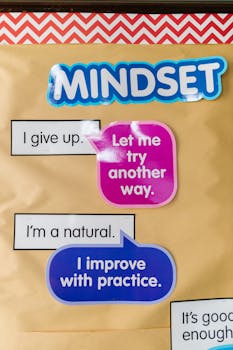What is fixed mindset?

What is fixed mindset?
Understanding the concept of a fixed mindset is crucial for anyone interested in personal development. This mindset can shape our thoughts, actions, and ultimately, our lives. But what does it truly mean? How does it differ from a growth mindset? Let’s dive deeper into this intriguing topic.
Understanding Fixed Mindset
A fixed mindset is a term coined by psychologist Carol Dweck, which describes individuals who believe that their abilities and intelligence are static traits. This mindset perceives talents and capabilities as unchangeable.
Definition of Fixed Mindset
In simple terms, a fixed mindset refers to the belief that personal qualities—like intelligence, skills, and talents—are predetermined and cannot be significantly developed. People with a fixed mindset often feel that they are either good at something or not, without the potential for improvement. This belief can be limiting, keeping individuals from pursuing new experiences or challenges.
For a more detailed exploration of this definition, you can check out this resource on fixed mindset.
Origins and Theories
The theory of fixed vs. growth mindset was brought to the forefront by Carol Dweck in her book “Mindset: The New Psychology of Success.” Dweck’s research suggests that those with a fixed mindset often feel threatened by the success of others and may avoid challenges, fearing they might expose their limitations. This mindset can inhibit learning and growth.
If you’re curious about Dweck’s theories, you can read more about them here.
Characteristics of a Fixed Mindset
Identifying the traits associated with a fixed mindset can help you recognize this way of thinking in yourself and others. Here are some common characteristics:
Fear of Failure
Individuals with a fixed mindset often avoid challenges and risks out of fear of failure. They may see a setback as a reflection of their intelligence rather than an opportunity for growth. This fear can paralyze them from trying new things or pushing their boundaries.
Resistance to Feedback
Another defining trait is the resistance to constructive criticism. People with a fixed mindset may view feedback as a personal attack rather than a chance to improve. This can lead to stagnation in personal and professional growth.
Avoidance of Challenges
Lastly, a fixed mindset leads individuals to shy away from challenges. If they don’t feel confident in succeeding, they may choose to avoid the task altogether. This limits opportunities for learning and self-improvement.
For a breakdown of these characteristics, you might find this link helpful.
Impact of Fixed Mindset on Personal Development
The consequences of a fixed mindset extend beyond personal beliefs; they can significantly hinder personal growth and productivity.
Effects on Learning and Performance
A fixed mindset can create a self-perpetuating cycle. When individuals believe they cannot improve, they may put less effort into learning and thus perform poorly. This low performance further reinforces their belief in their limitations, making it harder to break free from this cycle.
If you’re interested in understanding this phenomenon better, you can read more about it in this article on the dangers of a fixed mindset.
Relationship with Work-Life Balance
A fixed mindset can also negatively impact work-life balance. When one believes in their limitations, stress can escalate. They might avoid new responsibilities or challenges at work, leading to missed opportunities for growth and fulfillment. This avoidance can create a cycle of dissatisfaction and stress.
Transforming Fixed Mindset to Growth Mindset
The good news is that shifting from a fixed mindset to a growth mindset is entirely possible. Here are some strategies that can help.
Techniques for Mindset Shift
- Embrace Challenges: Start looking at challenges as opportunities rather than threats. Each challenge you face is a chance for growth.
- Learn from Criticism: Instead of resisting feedback, seek it out. Use it as a tool for improvement.
- Celebrate Effort: Focus on the process of learning rather than just the outcome. Recognizing effort can shift your perspective.
For more techniques, check out this comprehensive guide on changing your fixed mindset.
The Role of Self-Reflection
Self-reflection is vital in recognizing and changing a fixed mindset. Take time to consider your responses to challenges and feedback. Ask yourself:
- Do I shy away from difficult tasks?
- How do I react to criticism?
- Am I open to learning from others?
Reflecting on these questions can help you identify areas for growth.
Conclusion
In summary, understanding the concept of a fixed mindset is essential for personal development. Recognizing its characteristics can help you identify limiting beliefs that may be holding you back. As you explore ways to shift your mindset, remember that it’s a journey filled with opportunities for growth and learning. Embrace the challenges ahead, and reflect on your mindset regularly. Move towards a growth mindset for a more fulfilling and productive life.